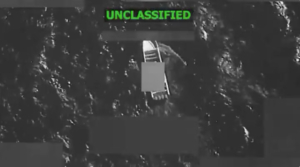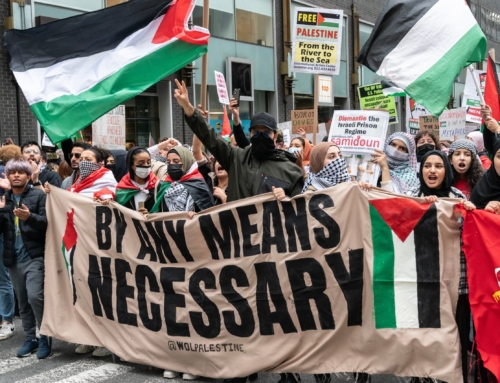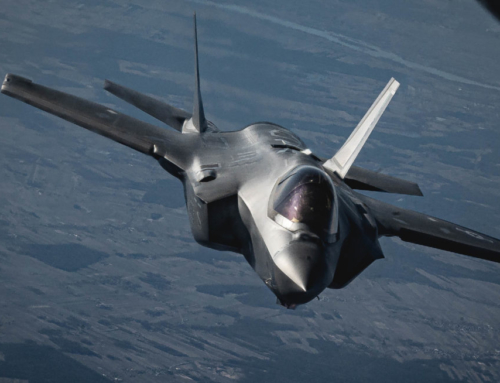 The US forces buildup in the Caribbean, including lethal action against alleged drug boats, and President Trump acknowledging that he had approved a finding of covert action in Venezuela, has all the pundits talking. While enormous ink has been spilled, three aspects of the recent events have not received the attention they deserve, so I thought I’d attempt to shed some light on them. Up front, I’m just calling balls and strikes as I see them. I’ve honestly tried to present my opinions through the lens of decades of study and operational employment against asymmetric threats, and not through a political filter. Having served through five different administrations, both republican and democrat, each side needs a reality check every once in a while.
The US forces buildup in the Caribbean, including lethal action against alleged drug boats, and President Trump acknowledging that he had approved a finding of covert action in Venezuela, has all the pundits talking. While enormous ink has been spilled, three aspects of the recent events have not received the attention they deserve, so I thought I’d attempt to shed some light on them. Up front, I’m just calling balls and strikes as I see them. I’ve honestly tried to present my opinions through the lens of decades of study and operational employment against asymmetric threats, and not through a political filter. Having served through five different administrations, both republican and democrat, each side needs a reality check every once in a while.
- Designation of drug cartels as Foreign Terrorist Organizations.
In late February, 2025, the US State Department designated eight different drug cartels as Foreign Terrorist Organizations. This designation gives the administration multiple new options to confront the cartels, mostly via the economic realm with sanctions and money freezing, but conveys no lethal authority in and of itself. The preponderance of the discussion has revolved around this second aspect – whether designating them as an FTO authorizes lethal force –but very little time has been spent discussing whether the designation was warranted in the first place. The short answer is no, the designation of the cartels as FTOs does not fit either historically or doctrinally with US policy and doing so waters down the accepted definition of “terrorism”. I discussed this detrimental aspect once before when Iran’s IRGC was placed on the list, and my argument still holds weight. In addition, years ago when discussing ISIS, I posted a piece discussing the definition of terrorism focusing on the tactics used. Today, I’d like to look at the strategic aspect, because as had happened with the ISIS discussion, words matter and will guide both our current and future actions, as well as our competitors.
There are many definitions of terrorism in the United States government lexicon, but all of them revolve around the group’s intent or raison de etre, which is focused on political, religious, or ideological goals.
- For instance, the department of defense defines terrorism as “The unlawful use of violence or threat of violence, often motivated by religious, political, or other ideological beliefs, to instill fear and coerce individuals, governments.”
- United States Code Title 18 calls terrorism : “..activities that involve violent… <or life-threatening acts>… that are a violation of the criminal laws of the United States or of any State and… appear to be intended (i) to intimidate or coerce a civilian population; (ii) to influence the policy of a government by intimidation or coercion; or (iii) to affect the conduct of a government by mass destruction, assassination, or kidnapping;
- USC Title 22 says: The term “terrorism” means premeditated, politically motivated violence perpetrated against noncombatant targets by subnational groups or clandestine agents, usually intended to influence an audience.
- The FBI’s former definition said, “The unlawful use of force or violence against persons or property to intimidate or coerce a government, the civilian population, or any segment thereof, in furtherance of political or social objectives.”
- The National Counter Terrorism Center defines terrorism as:”The use or threat of violence against civilians or property to intimidate or coerce a population or influence a government for political, religious, or ideological goals.”
All these definitions revolve around the intent of the organization, not the tactics or methods used, and that intent is to intimidate civilian and/or government in pursuit of religious, ideological, or political goals. None of the definitions include illegal activity designed for a profit as a component, which is what drug cartels pursue. Interestingly enough, on the FBI’s official website, the definition has been changed to state, “Violent, criminal acts committed by individuals and/or groups who are inspired by, or associated with, designated foreign terrorist organizations or nations (state-sponsored) or societies in pursuit of terrorist goals.” In effect, since they don’t want to contradict the current FTO designation of drug cartels with a definition that doesn’t describe them, they simply say, “Terrorism is any group or individual that works with a designated FTO,” with is a tautology, not a definition.
Drug Cartels are not trying to affect institutions or governments for ideological reasons, they’re doing it for profit, plain and simple. This does not mean they are legitimate organizations or that they aren’t murderous thugs, just that they aren’t terrorists – and words matter. The more we designate non-terrorist groups as terrorists the less the term means. The administration is looking at short-term effects by designating cartels as FTOs as it gives them additional tools to combat them and possibly gives them legitimacy to attack them, but the long-term effects may be felt when other countries follow our lead and begin labeling organizations they don’t like as terrorists, leveraging our own historical use. How are we going to chastise the Chinese CCP for placing Uyghurs in concentration camps when they say, “We designated them as terrorists. At least we put them in camps for “reeducation” instead of just killing them.” Or how will we protest Russia, which has killed dissidents in the shadows all over the European continent? What stops them from simply beginning an overt campaign of assassination and saying, “We call them terrorists, and following the United States lead, we simply kill them.”
On the domestic front, if designating a criminal group a terrorist organization is all the top cover needed to begin lethal operations, why couldn’t the mafia’s five families in New York be considered a Foreign Terrorist Group, allowing us to skip the pesky 4th, 5th, and 6th amendments in our constitution, and send in SWAT teams to shoot anyone associated? All we have to do is find any tenuous connection to the old country, and bingo – they’re an FTO. On the surface, the reader would say this is hyperbolic, but it’s exactly what we did with MS-13. Mara Salvatrucha (MS13) was formed in Los Angelese in the 1980s, and when some members returned to El Salvador, they became international. They’re on the new FTO list, open to lethal action, and only duplicate the criminal activities of the Mafia, so why not do that with any organized criminal organization?
While drug cartels can and do use terrorist tactics, it does not make them a terrorist group. Their ultimate goals would have to define them as such. In this case, they aren’t trying to overthrow the United States Government or impart religious fervor, they’re simply trying to make a profit with illegal products. Their violent activity is directed against the enforcement mechanisms designed to thwart this profit making. When they blow up a Mexican police station, or assassinate a Mexican city mayor, they aren’t trying to destabilize the Mexican government – that is a byproduct, not a goal – they’re only attempting to eliminate those organs from hampering operations. In fact, the last thing a drug cartel wants is a disrupted United States economy, because that would directly affect their goals. They need United States’ citizens to be able to purchase their product, and any terrorist tactics they use are solely against the enforcement activities against them.
Conversely, a true FTO could sell drugs, but that doesn’t cause it to lose its terrorist designation, as the drug profits are not the goal. They’re simply financial resources the terrorist group uses to further its ideological, political, or religious goals.
There is a simple way to determine this aspect, and that’s to postulate what would happen if legitimate organizations stopped attempting to thwart the illegitimate ones. If Mexico and the United States quit trying to stop the flow of drugs into the United States, would the newly designated FTOs continue using terrorist tactics? No, because they only do it insomuch as it prevents them making a profit. On the other hand, Hezbollah helps transport a massive amount of drugs out of the Tri-Border region of South America. If Israel were to quit attacking them in Lebanon, would Hezbollah stop its planning and attacks against Israel? No, they would not, as their goal is not profit, but the destruction of Israel, and the drug income helps them equip and arm. In the same vein, Al Qaeda didn’t conduct 9/11 because we were affecting its ability to make money. They did it for religious and ideological reasons, and our action or lack of action would not have detered them from those goals.
I understand that the term “terrorist” evokes greater sympathy for lethal action than “drug runner”, but using this designation is akin to arresting a fraudster who scammed retirees out of millions, and then designating them a murderer because the penalty is higher. Like the tenuous links made to call drug cartels “terrorists”, the same links could be made against the fraudster, contorting language to apply the crime of murder, but it doesn’t make it so, and in return, it dilutes what murder – or terrorism – really means.
In the year 2025, we have added more organizations on the Foreign Terrorist Organization list than in the entire previous decade combined, and the dilution of the list is harming why it was created. Given that, and understanding that the administration knows everything I’ve just written, I believe that the designation wasn’t done to dismantle the drug cartels. There is a different reason.
When I was fighting the GWOT, if we caught two people who were identified as having been associated with AQ, they would have gone to a black site or GITMO until we had wrung out of them every scrap of information they held about that organization. In today’s current operation, when we capture members of the new FTOs, we simply let them go. In October, we conducted a lethal strike against a boat coming from Venezuela. Two people survived the strike. In the GWOT, this would have been a boon to our efforts against AQ, because we were trying to understand the nodes and cells with which we were dealing. In the boat action, we made no attempt to learn anything, simply repatriating the ones we’d captured to their home countries, where they were set free – and in so doing showing the designation as an FTO is a chimera.
On Monday, a new “cartel” will be designated an FTO, and this one really stretches the boundaries of both the definition of FTO and what it means to be a “cartel”. The state department is designating Cartel de los Soles – or Cartel of the Suns – as a foreign terrorist organization. This cartel doesn’t really exist as an organized, hierarchical group, but is simply the nickname that Venezuelan opposition press uses to describe the Maduro government’s military leadership (Venezuela generals wear suns instead of stars for rank, thus the nickname). They are most definitely corrupt, and are most definitely profiting from the transiting of drugs through their domain, but the evidence shows they aren’t a formal organization. In the latest DEA National Drug Assessment, 2025, which lists every single drug cartel that is currently on the FTO list, Cartel de los Sole isn’t even mentioned in passing. In my opinion, their designation’s purpose isn’t to stop the flow of drugs, but to give top cover for the true mission: Regime change in Venezuela.
- Trump confirms he approved Covert Action in Venezuela.
This one truly astounded me, but the focus in the press on what this means really missed the mark. Up front, I’ll say that this might just be a bluff, as Trump having confirmed covert action defeats its core mission of “the role of the United States Government will not be apparent or acknowledged publicly.” In addition, we would need a robust platform to execute the action, and we have no US embassy or consulate in Venezuela. We could possibly do it cross border from Colombia, but that too might be a heavy lift, since Colombia has just cut off any intelligence sharing due to our lethal operations against the drug boats. Colombia approving a covert action campaign against Venezuela from its soil seems tenuous at best, but stranger things have happened. Taking the president’s words at face value – that he has approved a finding delineating Covert Action against Venezuela – I’m very surprised that the press hasn’t focused on what this actually means.
I’ve written about this extensively in the past, and one can click here to read it, but in short, Covert Action has a specific definition in US Code. This definition was finally created in Title 50 after the Iran Contra affair (which, ironically, today was the day that LTC North and Fawn Hall shredded documents relating to that activity), and it reads:
“As used in this subchapter, the term “covert action” means an activity or activities of the United States Government to influence political, economic, or military conditions abroad, where it is intended that the role of the United States Government will not be apparent or acknowledged publicly, but does not include—
(1) activities the primary purpose of which is to acquire intelligence traditional counterintelligence activities, traditional activities to improve or maintain the operational security of United States Government programs, or administrative activities;
(2) traditional diplomatic or military activities or routine support to such activities.
(3) traditional law enforcement activities conducted by United States Government law enforcement agencies or routine support to such activities; or
(4) activities to provide routine support to the overt activities (other than activities described in paragraph (1), (2), or (3)) of other United States Government agencies abroad.”
Read that closely. The operative words are “influence political, economic, or miliary conditions abroad.” The dictionary may state what it believes Covert Action is, but when it comes to US law, this is the meaning. In order for the administration to execute, the administration needs to create what’s known as a “finding”, delineating the ways, means, and ultimate goals of the action and why they are necessary to protect United States national interests. When talking about Venezuela, the most likely reason for the finding is affecting the political conditions in the country – in short, regime change.
Also read what is specifically excluded from the definition: traditional military activities or traditional intelligence collection. Thus, any military action in Venezuela would not be subject to this section of US Code, and does not require a finding, such as the current strikes against drug boats or future military activity in the country*. In the same vein, the CIA collecting intelligence on the stability of the Maduro regime or the pulse of the opposition does not fall under the definition, and does not need a finding. Neither does in-house planning of any activity that does meet the definition. Only actual execution of the plan requires a finding, and if the president’s words are taken at face value, he has approved a finding – which means he has approved action to affect the political, military, or economic conditions in Venezuela. The press keeps bloviating about the various courses of action the administration is considering for the Maduro regime, but if he’s approved a finding, he’s settled on one and is now executing. It amazes me of how little press this has generated.
- Counter Leadership Targeting and regime change – back to the future.
Having lived through the regime change in Iraq up close, and followed the regime change in Libya from afar, I’ve written about this subject extensively, to include a master’s thesis. When the Obama administration conducted Odessey Dawn against Qaddafi in Libya, I excoriated that operation on five separate occasions, and I’m hoping I don’t have to do the same with Venezuela. Generally, Counter Leadership Targeting will be attempted by the rational actor for one of two reasons:
- To cause the dislocation of the opponent organization’s ability to function in the prosecution of a conflict by removing the leader of the organization.
- To cause the opponent organization to alter its policy towards a conflict by replacing the leader with one whose objectives are in line with our own.
A CLT strategy of dislocation attempts to remove or hinder the direction of the organization. This strategy is not a means to an end, but rather creates conditions that allow the targeting organization to exploit the target’s loss of efficiency and effectiveness in the prosecution of the conflict. Conversely, an intent of replacement strives to alter the vision of the targeted organization and is an end unto itself.
Obviously, what the administration is attempting to do here is a strategy of replacement, but of the two strategies presented, replacement is the most difficult to accomplish. Success does not ride on the elimination of the current leader, but on the policies of the successor. These policies, in turn, are influenced by the power base of the organization. The goals of the overall organization will drive the successor’s vision. Thus, there must not only be a replacement leader whose views coincide with the targeting organization, but the power base of the target must feel that the replacement is the legitimate head of the organization and worthy of following.
In Venezuela we have such a replacement in mind – the recent Nobel Laurate Maria Corina Machado. By all accounts, she won the last election, which Maduro rigged in his favor, and is well liked in the country, but she’ll have to hit the ground running, co-opting the technocrats who Maduro relied on – including the “Cartel de los Soles”. This might be much more difficult to accomplish than we realize. Do we conduct a “de-Bathification” program a la Iraq, purging all the military of Maduro loyalists, thus leaving them open to picking up a rifle and fighting? Or do we leave them in place, attempting to leverage them while preventing them from causing trouble? There are no easy answers, and I’m old enough to remember that in all my tours in Iraq, I received the bullets of insurgents instead of the predicted rose petals of liberation. One thing is for sure, though: Getting rid of Maduro is only half of the equation, and his ouster will open a power vacuum that someone will have to fill – either our own military, or one that’s antithetical to our own goals.
One other aspect being ignored in the media reporting is that there are other world actors who do not want us to succeed. I have seen multiple open-source analyses of what will happen if Maduro is deposed, from the rose petal, rose colored glasses of a perfect transition to full on chaos, with the ELN from Colombia joining Maduro forces to cause trouble. In none of these was the specter of other, non-Venezuelan actors putting their thumb on the scale– most notably Russia. Make no mistake, Russia remembers well our meddling in Afghanistan, causing them to flee the country and the subsequent collapse of the Soviet Union, and is fully aware of our support for Ukraine that’s turned Russian’s invasion into a quagmire, and they would like nothing more than to return the favor. Even if the rose-colored picture of a perfect transition is possible within Venezuela, factoring in only Venezuelan metrics, Russia will most certainly cause that to fail. Reports are already stating that Maduro has Russian advisors on the ground, and make no mistake, those advisors are planning activities for after the fall of his regime for no other reason than they’d like for us to be drawn into the messy mud of stabilization. If our history has shown us anything, it’s that calling an operation a success after the fall of the targeted regime is only half the equation, and if not carefully thought out and managed, we could end up with a bigger mess than we started with. Remember, we only ended up with the Ayatollah’s in Iran because we conducted a regime change there in 1953.
In the end, all three of these points have received little granular attention in the press, and I think they’re important. I just hope the administration is holistically looking at the problem, taking the repercussions of our past energetic actions into account while executing this one.
* This is not to say that the military has no guardrails and can conduct operations willy nilly. The War Powers act is one – although the administration is ignoring it. Time has run out for the employment of forces in the Caribbean without consultation with congress, but the administration has, in one breath, said that the attacks on drug boats are legal because we are now at war with the drug cartels, and then in another breath said the War Powers Act doesn’t apply to this war.










A breakdown. Detail is clear.
“Terrorist organization” definition is and will contnue. The trump definition is a dangerous political anomaly.
I think I largely agree with your comments and opinions. I don’t necessarily agree that it’s improper for the president to designate drug cartels as foreign terrorist organizations. While the intent of the organization is important for the designation, I think their actions and conduct should be given a lot more weight than their intent. Clearly, the drug cartels employ terrorist action, such as kidnapping, bombings, murders, and a whole other list of things that “terrorize” Americans. Their “ideology” of selling drugs for profit is no different than others FTOs whose ideology is focused on religion as opposed to profit. It matters little to the victims of these cartels that the motive is monetary profit as opposed to religious “profit.”
What would you suggest any administration do to combat the drug cartels which are definitely a clear and present danger to Americans? In the current political climate where everything is politicized it is not effective to combat drug cartels through law enforcement. The drug cartels represent a unique threat to Americans that cannot be competed with traditional methodology. I don’t always agree with everything that Trump administration is done, but I do applaud his efforts to use unique ways to deal with this problem.
Thoroughly enjoy reading your books, though, keep them coming!!
I completely understand the desire to define terrorism by the tactics involved, but that defeats the purpose, as tactics do not define intent, and without intent, EVERYTHING can be classified as terrorism, which means nothing is. For instance, a man can run over a child with his vehicle (the tactic), but his intent will determine whether it was manslaughter or murder. Did he not see the child because he was texting, or did he see the child and swerve intentionally? In both cases, it’s the same tactic, but the intent is decidedly different. A thug carjacking a vehicle terrorizes the owner, but that does not make him a terrorist. A bank robber ordering everyone to get on the floor behind the barrel of a gun terrorizes the bank patrons, but he is not a terrorist. We have a word for him: Bank Robber. Just because he’s defined as a bank robber doesn’t make him innocent. Like the drug cartels, there is no reason to call him a terrorist just because we want to paint him with a bigger brush. And the drug cartel’s ideology is wildly different from actual terrorist groups. It’s the very point I’m trying to make. Please read the original blog on this point: https://bradtaylorbooks.com/2015/02/19/not-simple-primer-terrorism/
For some reason people seem to think by me saying drug cartels aren’t terrorists I’m implying that we can’t do anything against them or that they’re somehow more legitimate. This blog in no way made any judgement calls as to what course of action should be taken. My only hesitation is that we’re confusing motion for progress. You state: “The drug cartels represent a unique threat to Americans that cannot be competed with traditional methodology. I don’t always agree with everything that Trump administration is done, but I do applaud his efforts to use unique ways to deal with this problem.” What part of his unique ways do you see as having a positive impact on stopping the flow of drugs into the United States? If Fentanyl is truly the scourge of this current epidemic, how will regime change in Venezuela stop that, as Venezuela traffics in cocaine, not fentanyl? That’s just one point, but there are many more. We like to see fireworks and strong action because it makes us think we’re doing something, but we should always analyze whether that “something” is actually having any effect on the defined problem. I have zero issue with lethal force against national security threats, but honestly, lumping the Mexican drug cartels in with Venezuela as if it’s a holistic problem set is a problem in and of itself. Anyway, the blog was just an analytical explainer of current activities. It wasn’t meant to cast judgement – for instance, I’m not saying whether regime change in Venezuela is good or bad. I AM saying that we’d better think it all the way through before executing.
I do appreciate your point, and thanks for reading!
It’s Colombia. Not Columbia.
Oops. Fixed.
Brad Taylor, thank you for making me think. Although some of what you have said goes completely over my head I value your past experience and the knowledge you have gained through those experiences. One thing I am convinced of is that illegal drugs are a scourge on our country and something needs to be done – something different from the failed policies to date.
Hi from Singapore:D
What are your thoughts on Hegseth’s strike on the Venezuelan boat and Admiral Bradley carrying out the order to “kill them all”? In my opinion, Hegseth is nothing but a performing monkey and he probably thinks his second strike makes him a real tough guy. And ordering SEAL Team 6 to do it makes him the toughest warrior on this planet. What would YOU have done if you were Bradley? What would Pike have done?